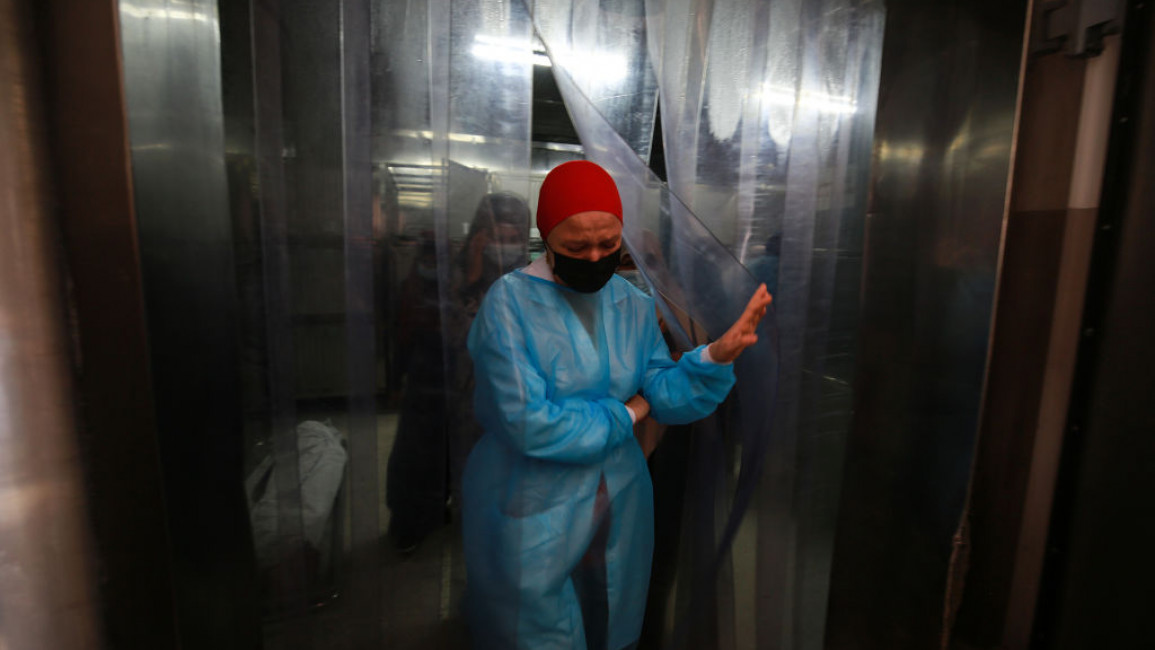The recent attacks on Gaza which killed 49 people, exacerbated the already existing health crisis in the Strip. Yara M. Asi explains how Israel’s blockade, which has weakened the healthcare system, has been killing Palestinians for over 15 years.

In the Gaza Strip, another ceasefire shakily takes hold. The families of at least 49 people (including 17 children) killed in the latest Israeli attacks on the Strip are now trying to figure out how to live life without them. Gaza’s paramedics, physicians, and nurses try to find some moments to rest in between providing life-saving trauma care with minimal supplies and staffing. And Gaza’s youth are hitting the streets with brooms and garbage bags, picking up the rubble and destruction left behind.
Another round of bombing to add to the many in the last fifteen years or so—this one, mercifully shorter than the assault in May 2021, which killed 261 Palestinians. As usual, these visible spectacles of violence and devastation made global news and are among the few times Palestinian suffering is openly discussed.
It is difficult to avoid, with photos and videos of the bodies of dead children and the anguish of their families widely visible on social media. This type of death—sudden and violent—is widely understood by a global audience. Yet, the people of Gaza, including its children, have been dying in much slower and more insidious ways for decades, especially since the imposition of the blockade more than 15 years ago.
On 2 August, days before the first bombing, Gaza was already experiencing a life-threatening emergency that received almost no global attention, aside from a few press releases by human rights organisations.
Israel, which controls almost all movement in and out of the Gaza Strip, had closed all its crossings with Gaza, including Erez, where patients requiring urgent medical care and others needing humanitarian services must exit, and Kerem Shalom, the border crossing where Gaza receives its goods, including the fuel that is required for Gaza’s only power plant. That meant residents had up to 4 hours of consistent power per day.
This is just the most recent example of the collective punishment experienced by residents of Gaza, which results in poor physical and mental health outcomes that are completely unrelated to the occasional bombardment its residents endure. Constant stress and trauma, high food and water insecurity, and the long-term results of violence from Israeli bombs and snipers, including thousands of amputations, mean that health outcomes in Gaza are poor on every measure, even when compared to Palestinians in the occupied West Bank.
Israeli control over what enters Gaza, especially those items restricted under the “dual use” policy, has rendered the health system wholly incapable of responding to these challenges. Restrictions on concrete and pipes means that some health facilities that are bombed won’t be rebuilt. Shortages on basic goods like IV bags and gauze are common.
Advanced treatments for chronic illnesses like cancer do not exist in the territory at all, requiring an Israeli-issued permit to leave Gaza and receive needed care in Israel or East Jerusalem—a permit that is often arbitrarily denied or delayed to the point where patients miss hard-to-get appointments. A physician cannot even expect electricity for an entire shift.
The result of these policies is, then, not surprising. Life expectancy is among the lowest in the Middle East (and nearly ten years shorter than Israelis), infant and maternal mortality is high, and malnutrition is prevalent, with high levels of stunted growth and iron deficiency among children.
The initial Covid-19 vaccination response was extremely slow, due in large part to Israel not only ignoring its own obligations as an Occupying Power, but also blocking Palestinian and external efforts to combat it. By 2 February 2022, only 30% of those in Gaza were fully vaccinated.
Among human rights groups and some progressive politicians, there has been significant condemnation of many governmental statements released in response to this latest bombing, almost all of which repeat the same recycled lines about Israel’s right to defend itself. This was despite endless evidence that by no standard should its decades of collective punishment of Palestinians be considered a legitimate security response. Few mentioned the Palestinians killed in the name of this supposed self-defence, including the many children. It is true that these one-sided, ahistorical, and uncritical statements deserve denunciation.
But what about the days and weeks and months in between the bombings, when the people of Gaza, more than half of whom are children, are still living in an effectively enclosed territory, their suffering largely forgotten by the world or, even worse, justified? The condemnations must continue until this unjust and illegal blockade is lifted.
No country can profess to be a defender of human rights while continuing to ignore and enable what is being done to this civilian population, especially after months of platitudes about the immorality and illegality of Russian attacks in Ukraine and their own attempts to strangle food supplies. Merely referencing Hamas or other Palestinian militant groups in response to questions about the bombing of families in their own homes should no longer be acceptable. Nor can it be, then, when justifying keeping cancer patients from receiving treatment, children from having adequate access to food, and doctors from having what they need to save their patient’s lives.
